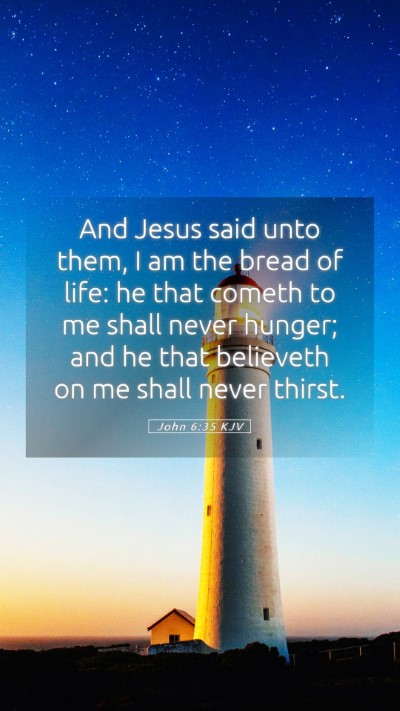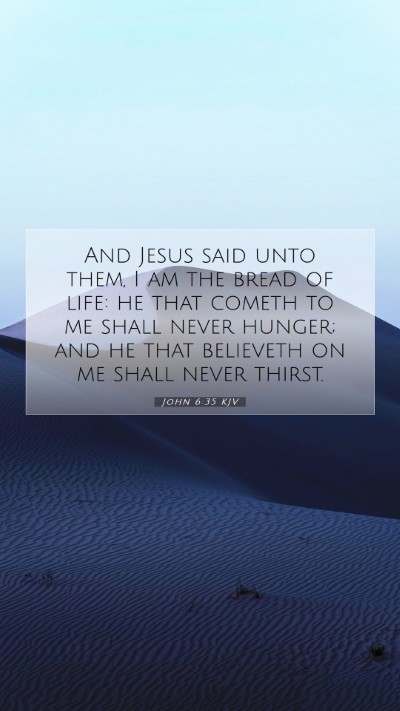Bible Verse Meaning and Commentary: John 6:35
Verse: "And Jesus said unto them, I am the bread of life: he that cometh to me shall never hunger; and he that believeth on me shall never thirst." - John 6:35
Overview of John 6:35
This profound declaration by Jesus underscores His role as the spiritual sustenance for believers. He identifies Himself as the "bread of life", a metaphor steeped in the traditions of Jewish dietary laws and the significance of bread as a staple in their diet. In this statement, Jesus reveals that He is essential for spiritual nourishment and eternal satisfaction.
Meaning of the Verse
John 6:35 communicates several critical theological themes that resonate throughout the Gospel of John:
- Jesus as the Source of Life: This declaration places Jesus at the center of spiritual existence, emphasizing that true life is found in Him alone.
- Invitation to Believers: The phrases "cometh to me" and "believeth on me" indicate that faith in Christ is the pathway to fulfillment and eternal life.
- Assurance of Satisfaction: The verse reassures followers that their spiritual needs will be fully met through their relationship with Jesus.
Insights from Public Domain Commentaries
Matthew Henry's Commentary
Matthew Henry emphasizes that Jesus reveals His divine nature through this statement. He draws parallels between the physical sustenance of bread and the spiritual nourishment provided by Christ. Henry points out that Jesus fulfills the need for both physical and spiritual sustenance, calling individuals to a relationship with Him that transcends mere physical needs.
Albert Barnes' Notes on the Bible
Albert Barnes elaborates on the metaphor of "bread" as an emblem of sustenance, drawing attention to its fundamental role in human life. He notes how Jesus satisfies not only the hunger of the body but also the deeper spiritual longings of the human soul. Barnes insists that the phrase "he that cometh to me" underscores the necessity of actively seeking Jesus for true nourishment and thirst quenching.
Adam Clarke's Commentary
Adam Clarke provides a detailed analysis of the cultural significance of bread and its implications in the Old Testament, highlighting that the Israelites were fed with manna in the wilderness, which serves as a precursor to Jesus' claim. Clarke points out that Jesus is the ultimate fulfillment of God's provision and is accessible to all who seek Him. He stresses that Jesus' proclamation is not merely about physical bread but about the spiritual sustenance unique to Christ alone.
Theological Implications
John 6:35 has profound implications for understanding Christian life and faith. The metaphor of bread reflects God's ongoing desire to nourish humanity spiritually. The assurance that those who come to Him will never hunger or thirst embodies the perpetual fulfillment found in Christ. This highlights the concept of grace, as it is through faith, not works, that believers receive spiritual nourishment.
Application in Daily Life
For many seeking Bible verse meanings and practical application, John 6:35 offers significant insights:
- Embrace Spiritual Disciplines: Regular prayer, Bible study, and worship serve as means to partake in the "bread of life." Believers are encouraged to cultivate their relationship with Christ.
- Share the Bread of Life: Christians are called to spread the good news of Jesus. Just as bread is shared, the message of Christ should be shared with others to meet their spiritual needs.
- Trust in God's Provision: In times of spiritual hunger and thirst, this verse reassures believers to come to Christ with confidence, knowing He will satisfy their longings.
Related Bible Cross References
- Matthew 4:4: "But he answered and said, It is written, Man shall not live by bread alone, but by every word that proceedeth out of the mouth of God."
- John 7:37: "In the last day, that great day of the feast, Jesus stood and cried, saying, If any man thirst, let him come unto me, and drink."
- Exodus 16:4: "Then said the LORD unto Moses, Behold, I will rain bread from heaven for you; and the people shall go out and gather a certain rate every day, that I may prove them, whether they will walk in my law, or no."
- John 11:25: "Jesus said unto her, I am the resurrection, and the life: he that believeth in me, though he were dead, yet shall he live."
- Revelation 3:20: "Behold, I stand at the door, and knock: if any man hear my voice, and open the door, I will come in to him, and will sup with him, and he with me."
Conclusion
Overall, John 6:35 serves as a foundational scripture for understanding Jesus as the essential source of spiritual sustenance for believers. The insights gleaned from renowned public domain commentaries enrich our understanding and deepen our appreciation of this promise from Christ. As you engage with this verse and explore its meanings through Bible study guides, may you find strength and fulfillment in the bread of life.


